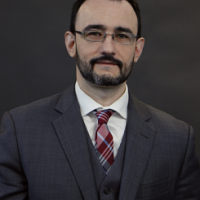Victory Parade and the Russian Military Strategy
On June 24, Moscow will hold a military parade to commemorate the 75th anniversary of the end of World War II. This year the annual ritual, normally held on May 9 but postponed because of the pandemic, has acquired an even more powerful symbolic significance, as it is being held on the same date that the first victory parade took place in Moscow in 1945. Michael Kofman, Olga Oliker, Jeffrey Edmonds, and Aleksandr Golts discussed the actual and symbolic roles that the military plays in the Russian national narrative advanced by the Kremlin and considered how that shapes Russian military strategy today.
For more information on this topic, you can listen to our recent Russia File Podcast here.
Selected Quotes
Olga Oliker
"The very fact that there was a huge parade in Russia to celebrate 75th anniversary of the end of World War II underlines just how central World War II continues to be in Russia's narrative about itself and about its policies, something you don't see in a lot of other countries 75 year after the war ended. The reasons for this are many: social, cultural, political... It does seem to me that a lot of it has to do with wanting to be cast as the good guy against the bad guy, so there's not a lot of room for shades of grey. WWII is something of a classic "good war" in historical memory so adding shades of grey to it is not appealing to countries that want to remember their history heroically. But, if everybody still wants to be the good guy, not everyone is quite as enthusiastic as the Russians about continuing to remember in such detail a war that really did take place three generations ago. From a military context, WWII has cast a pretty long shadow on post-Soviet and then Russian strategy, force posture, the way the Russians think about war."
"Because the Russian military was so decimated in the interval between WWI and WWII, WWII also offers a lot of first war aspects, which had staying power in Soviet and then Russian military thought... These are an emphasis on fire power and artillery, on the one hand, and a fear of surprise attack, or preemption, on the other. These don't only affect how the USSR and Russia structured guarantees with nuclear weapons. They affected a lot about how Russia fought and continues to fight. But what's interesting is we also see evolutions, right? It's not as though you can look to WWII and it tells you everything you need to know about how Russia fights war. Syria does not look like Chechnya. So the question of, how long can the shadow really last, whether in the conventional or nuclear realm, is important. But, because forces are budgeted for and built and then stick around for awhile, these shadows are sticky."
Michael Kofman
"The eve of the war is a really important story because although Barbarossa leaves us in fear of a surprise attack, and we think of it as a surprise attack, it was not. The Soviet high command knew it was coming and, in fact, they knew the timing of the attack, but Stalin had issued orders not to deploy forces or to go on alert... The Soviet political leadership profoundly misjudged Hitler's intentions and we know this in part due to good German disinformation but also because of the path dependency in Soviet thinking on what Hitler intended to do. And this afterwards engendered considerable military distrust of the political leadership because the military had to reckon with the proposition that when faced with the imminent threat to the survival of the nation, the political leadership would not make the right decision on the eve of this threat."
"Over the decades since the war, it morphed first into Soviet professional confirmation bias that there would be a planned first strike and that strike would be disarming, paralyzing, or decapitating. During the Cold War, it took shape in the Soviet military expectation that it would be a disarming nuclear first strike. In the mid-2000s and late 1990s in the Russian military, the concern was a disarming conventional strike... That proved pretty unrealistic and I think that debate really got settled on the current Russian statement, which is concerned with a paralyzing and destructive airspace attack."
Aleksandr Golts
"This parade shows again that the armed forces in Russia are much more than just an instrument of defense. It became something totally different. Putin wanted to hold this parade despite the real risk of epidemic. Up until now, thousands of people have been ill with coronavirus in Moscow and it’s a huge risk just to gather people, just to gather 14,000 participants and a lot of guests in one place in Red Square... Russia military medical authorities was really anxious over this situation and they reserved 2000 places in Moscow hospitals in order to cure those who will be the victims of this infection. Nonetheless, Putin wanted this parade and he got it for a very clear political reason, the parade was an important instrument in public mobilization before voting for the constitutional amendment."
"This parade... is a demonstration of unity between the current Russia and the Soviet Union, which won the victory 75 years ago.... This victory is the main, important reason that Russia should be a permanent member on the U.N. Security Council, the reason why Russia has the right to solve the future of other countries, because Putin's vision of the modern world is classical realpolitik. The big guys are sitting at the Yalta table and solving the future of the small ones, trying to undermine each other's force. That is his vision of the modern world and that's why on this Victory Day for him it is much more important not that there's a banner on the Reichstag but a seat at the Yalta table, which gives him the right to dictate the future."
Jeffrey Edmonds
"While focus on the initial period of war goes back to the 20s and 30s, it really takes on a life of its own after the initiation of hostilities by Nazi Germany and Operation Barbarossa... That operation wasn't really a surprise, the surprise was how bad it went after that. By November, December of 1941, the casualties and loss of equipment was just incredibly massive. And so, what do we mean by the initial period of war, well, when Soviet military strategists looked back at the start of WWII and Operation Barbarossa and what constituted the initial period of the war, the discussion actually varied a bit. In the beginning, it was when your main formation gets to the fight. Well that clearly wasn't the case."
"When you look at Russian military doctrine procurement exercise, one really sees an understanding and an appreciation of how fast a conflict can change during its initial period and you can quickly gain the upper hand, say, through an aggressive escalation management framework. There's also a lot of discussion about gaining information dominance in the beginning of a conflict, to use your opponent and take advantage of that and take the upperhand early on. "
Speakers

Senior Fellow, Russia and Eurasia Program, Carnegie Endowment for International Peace


Senior Research Scientist, Center for Naval Analyses

Deputy Editor, EJ.RU; Visiting Researcher, IRES, Uppsala University
Moderator

President and CEO, US Russia Foundation
Hosted By

Kennan Institute
After more than 50 years as a vital part of the Wilson Center legacy, the Kennan Institute has become an independent think tank. You can find the current website for the Kennan Institute at kennaninstitute.org. Please look for future announcements about partnership activities between the Wilson Center and the Kennan Institute at Wilson Center Press Room. The Wilson Center is proud of its historic connection to the Kennan Institute and looks forward to supporting its activities as an independent center of knowledge. The Kennan Institute is committed to improving American understanding of Russia, Ukraine, Central Asia, the South Caucasus, and the surrounding region through research and exchange. Read more
